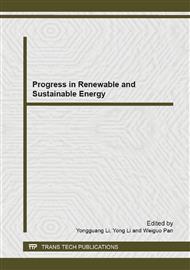p.569
p.573
p.579
p.584
p.588
p.592
p.601
p.607
p.611
Research on Reliability Assessment of Power System with Wind Farms
Abstract:
Due to randomness and fluctuation of wind speed, reliability of power system will be affected severely with increasing wind energy injected into power grid. In order to evaluate the effect on reliability of power system with wind farms, the author considers feature of time-sequential and self-correlation of wind speeds and builds an auto-regressive and moving average (ARMA) model to forecast wind speeds. Combining with state models of conventional generating units, transmission lines and transformers, a time-sequential Monte Carlo simulation reliability model is proposed to do reliability assessment of composite generation and transmission system with wind farm. IEEE-RTS test system is introduced to prove the proposed model. Analysis and comparison of results show that reliability can be improved clearly after integration of wind farm.
Info:
Periodical:
Pages:
588-591
Citation:
Online since:
December 2012
Authors:
Keywords:
Price:
Сopyright:
© 2013 Trans Tech Publications Ltd. All Rights Reserved
Share:
Citation:


